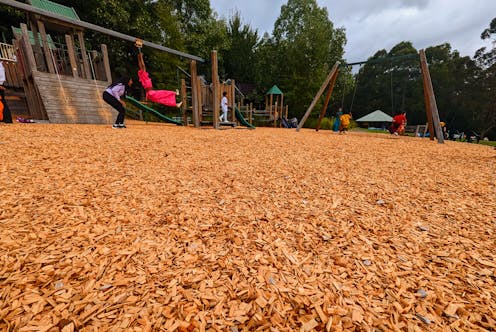how to avoid a repeat of this circular economy scandal
- Written by Salman Shooshtarian, Senior Lecturer, School of Property, Construction and Project Management, RMIT University

Asbestos has been found in mulch used for playgrounds, schools, parks and gardens across Sydney[1] and Melbourne[2]. Local communities naturally fear for the health[3] of their loved ones. Exposure to asbestos is a serious health risk – depending on its intensity, frequency and duration[4] – as it may lead to chronic lung diseases[5].
The source of contamination is believed to be timber waste[6] from construction and demolition sites that was turned into mulch. So far, 60 locations in Sydney[7] and 12 in Melbourne[8] have been identified as contaminated with asbestos to various degrees. The numbers could increase as investigations continue.
Following the initial detection in New South Wales and Victoria, an investigation in Queensland[9] detected asbestos in one compost and one mulch product.
The severity, spread and impact of the issue convince us to call it the largest scandal in the history of Australia’s circular economy[10]. A circular economy recycles and reuses materials or products with the goal of being more sustainable.
Our research[11] highlights the importance of making it mandatory to certify recycled products such as mulch to ensure their safety. We found none of the local, state or national policies on sustainable procurement practices recommend recycled product certification as a preventive strategy. We also found significant levels of ignorance and resistance to certification schemes in the recycling sector.
These obstacles must be overcome so we have certification of recycled products that ensures their quality[12], performance, environmental friendliness and safety.
Read more: Building activity produces 18% of emissions and a shocking 40% of our landfill waste. We must move to a circular economy – here’s how[13]
Scandal is damaging for the circular economy
The discovery in January of asbestos in mulch in NSW triggered a series of actions. These have involved the NSW and Victorian Environment Protection Authorities, local councils[14], Fire and Rescue NSW[15] and a NSW taskforce[16], drawing from agencies such as SafeWork, Public Works and the Natural Resources Access Regulator. The actions include testing in identified areas, cordoning off and signposting affected garden beds, engaging licensed asbestos removalists, and sampling to determine disposal options.
Unfortunately, this contaminated mulch raises concerns about the reckless implementation of circular economy principles in Australia. This scandal could make users of recycled materials, particularly local councils, hesitate about procuring these resources, if not dissuade them altogether.
Understandably, the waste management and resource recovery sector is in a state of shock. More broadly, this scandal could undermine efforts[17] to advance the circular economy in Australia.
It’s a reminder that the circular economy concept is based on a system-thinking approach, where all elements must work in harmony. A failure in one can result in the entire system collapsing.
Regulations don’t go far enough
Under NSW legislation, mulch must not contain asbestos, engineered wood products, preservative-treated or coated wood residues, or physical contaminants such as glass or plastics.
However, it isn’t mandatory[18] for suppliers to test for contaminants in mulch. There are no specified procedures they must follow to ensure mulch doesn’t contain asbestos.
The fact is existing policies and regulations, such as the NSW Environment Protection Authority’s Mulch Order 2016[19], failed to prevent mulch contamination. It’s a reminder of the need for effective strategies to ensure a circular economy will not go wrong.
These strategies must integrate encouragement, education and enforcement. Otherwise, we risk facing unintended economic, environmental and social consequences.
Read more: Buildings used iron from sunken ships centuries ago. The use of recycled materials should be business as usual by now[20]
Why isn’t certification standard practice?
At RMIT University’s Construction Waste Lab (CWL[21]), we have been researching and sharing key strategies with policymakers and industry. In 2022 and 2023, working with researchers from Griffith and Curtin universities and our industry partners, we explored[22] the use of recycled product certification schemes.
In our research[23], supported by the Sustainable Built Environment National Research Centre[24], we gathered insights from 16 industry professionals engaged in projects involving large quantities of recycled materials. We specifically asked for their views on certification schemes for these materials.
We found only nine of them were aware of such schemes in Australia. A similar number supported their use for construction projects. The main reasons for not supporting them are shown below.
















